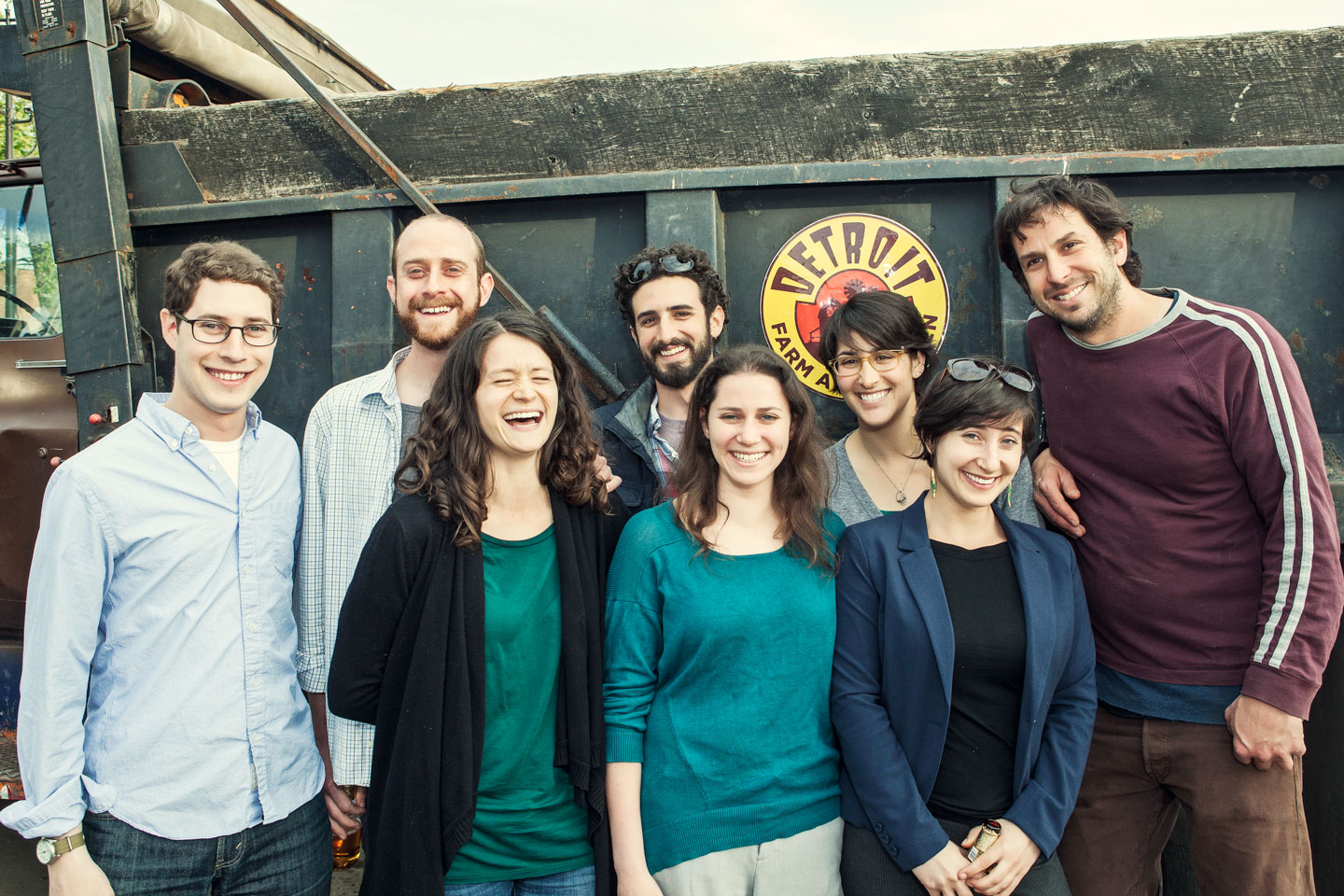With summer on the horizon, it’s clear that Detroit is a great place to live, work, play and to grow, particularly if you are young, Jewish and green.
To learn more about the people and places changing the landscape of the city, we gathered at Detroit Farm and Garden, a retailer and neighborhood hub in Corktown, to sit in on a “roundtable conversation” on all things green.
Boots on the ground
Representative of the many up-and-running green businesses, food enterprises, neighborhood gardens, farmers’ markets and nonprofits working throughout Metro Detroit, there were eight in attendance – all passionate advocates for a greater, greener Detroit, and ready to share their insights on the city’s future:
Josh Kanter, 27, Community Outreach Associate, Federation’s NEXTGen Detroit, representing the Do It for Detroit Fund initiative, working in partnership with the nonprofit Repair the World on a series of five micro-grant competitions and events in effort to engage young adults in meaningful service
Rachel Klegon, 27, Executive Director, Green Living Science (GLS), a Detroit-based non-profit organization which provides recycling and environmental education to students in the Detroit Public Schools, reaching more than 40,000 students since 2007.
Jeff Klein, 39, Co-founder, Detroit Farm and Garden, providing quality gardening, farming and landscape supplies and resources to Detroit’s communities.
Blair Nosan, 28, Spontaneous preservationist and entrepreneurial pickler, owner Suddenly Sauer, board member Isaac Agree Downtown Synagogue, co-founder, gardener and mentor, Eden Gardens.
Harry Reisig, 35, President and founder, Replanting Roots, a new model for re-entry, where returning citizens have the opportunity to develop the skills, spirit and support network needed to start new green businesses.
Jennifer Rusciano, 25, Founder, Detroit Food & Entrepreneurship Academy, a nonprofit working to empower Detroit high school students by providing them with the experience of crafting socially, environmentally and economically healthy food from kitchen to marketplace.
Eitan Sussman, 31, Co-Director and manager of Advanced Programs, Keep Growing Detroit, a network and resource working to promote a “food sovereign Detroit” where the majority of fruits and vegetables consumed by Detroiters are grown by residents within the city’s limits.
Amit Weitzer, 27, Detroit Programs Coordinator, Student Conservation Association (SCA), a national conservation corps that creates opportunities for young people to play a meaningful role in protecting and stewarding national parks, city parks and community green spaces.
A question of networks, sharing resources
Comprising a network of friends working in nonprofits and green businesses, the group was assembled at the invitation of Jeff Klein. Two participants in the discussion – Jen Rusciano and Blair Nosan – are leaders in nonprofit community organizations that recently received grants from the Do It For Detroit Fund. All would agree that food, justice, security, a sense of community and more intelligent and responsible use of land are central issues to the resurgence of the city. Each in their way have been inspired to seize opportunity to bring neighborhoods back to life.
Setting the tone for the meeting, Jeff, self-identified as the “Dude,” opened the discussion:
“I believe in the power of landscape to transform
communities and to change people in profound ways.”
Here are highlights of what the group had to say:
On working and living “green” in Detroit
Harry: What pulled me back to Detroit was realizing that there are so many wonderful, sincere, generous and hard-working people – businesses and non-profits like Earthworks Farm, the Garden Resource Program, BlightBusters — all willing to connect and share. Here, I found I could connect, like no other place I know.
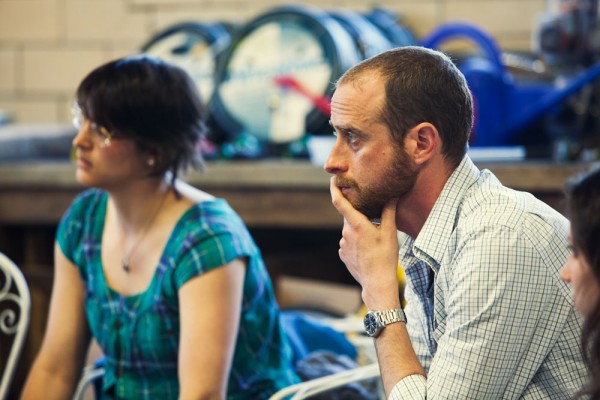
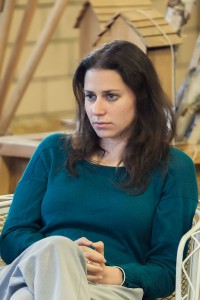
Rachel: I think it all depends on how you define green, too. We tend to think of green industries as segmented. For example, my “green” work revolves around trash – packaging, recycling, composting – which is not always understood as being interconnected with other networks such as food, farming and gardening.
Jeff: For me, it’s been enlightening to find so many young Jewish people doing “green” work and who share similar concerns. We’re all connected.
On revenue streams and community connections
Without question, the green movement is here to stay in Detroit with the potential to turn the city into a model for sustainable, walkable, workable and vibrant urban neighborhoods.
The group would concur that turning believers into backers is still a challenge. Funding sources and access to resources greatly vary:
Blair: We live in a relationship city. But it’s complicated because many of our networks are still segregated. For example, there’s a network sitting right here around the room, and that’s power. But I know I have access to certain resources which I can get from this network much more readily than others can.
Rachel: We get the majority of our funding from the community – from the recycling center, from the proceeds of the cardboard that is brought in. We have a few corporate partners as well as individual donors. The other large portion of our funding comes from programming.
Eitan We’re in a similar boat. I would stress the importance of a diversified revenue stream, including private foundations, donations, program fees and other sources of earned revenue, so that we’re not reliant on a single grant source.
Amit: Johnson Controls, Inc. has supported the Detroit Conservation Leadership Corps program for the past six years. We constantly work to complement our youth employment programs with other programs made possible through micro-grants, including a grant from the Community Foundation for Southeast Michigan’s Youth Advisory Committee to support a pilot apprenticeship program for our 2013 season. We are eager to see the youth program alumni grow into leadership positions in the program.
Harry: I’ve been really fortunate, connecting to individuals who have led to other resources. Patti Aaron, whom I met at a Hillel event in Ann Arbor, has been very generous and given us a grant to get a lot of things moving for our organization. And that led to two grants totaling $10,000 from Rock Venture Capital. These grants helped us get the attention of key organizations. We’ve just received a sizable grant from the Kellog Foundation, which we plan to leverage for further funding nationally.
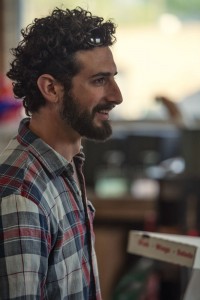
Jeff: I don’t go after a lot of funding, but have received some, using non-profit and for-profit collaborations. We rely on each person who walks through the door as a part of our revenue stream.
On fundraising and ethical choices
Eitan: When it comes to fundraising and networking, we try to be intentional and mindful where the money is coming from. By aligning our organization with companies that support the things we do with their own ethical practices, we can better communicate our own mission.
Rachel: It’s important to know your own values. When you believe in your mission, and believe in your work, you’re going to find a way to do it.
Amit: Another way to be intentional around fundraising is to be critical of the way we articulate our mission and goals. I think it’s important to tell the story of our work in a manner that uplifts the leadership and the agency of the young people who participate in the program, and even better, to engage them in telling the story themselves.
“I credit Detroit for teaching me about my place in the world. . .”
I credit Detroit and Detroiters for teaching me about my place in the world and my privilege – moving here, getting to know the folks in this room and around the city, having conversations like this.
Blair: I think the Jewish community has a strong tradition of keeping resources invested in our community. When we define the city, not just the Jews in the city, as part of that community, we are obligated and accountable to a broader spectrum of people.
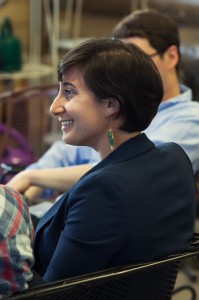
Jeff: What connects us here – and what surprises me to have in common with so many here — is that we’re Jewish. When I first started growing my business in Detroit, I didn’t really think much about it. It’s only come to me in the last few years, to be honest, and it’s amazing to me to what extent that part of my life now plays out.
Amit: I used to be a camp director and I think that the camp model is really effective in creating leadership opportunities for young people. I try to bring that ethic – which I cultivated in a Jewish camp space — into my current program.
On managing expectations: process vs. product
Blair: I think there’s a tension between process and product. I’m really process driven. I want leaders to emerge from the kind of work that I’m doing. I want to build leader-rich work and organizations. And, that takes a lot of human resources. People (funders) generally want to see product. Process is harder to share.
Jen: That resonates with me. Within our organization, we have people from all different backgrounds and means who participate both as students within the program and within our leadership.
There’s a certain point to which I can push the narrative of subverting privilege – trying to bring opportunity to the young leaders with whom I work. And, then, there’s prioritizing process over results, where my organization is very interested in figuring out how we can leverage opportunities to folks, especially young people, but also how to make sure that they can be successful in any project they choose, or any career without having to have the same access that we have had.
So it’s a struggle. How to make something not just work for us, but work for every young person that comes after us and through us, to make sure they can build.
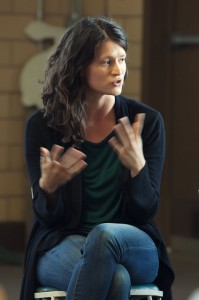
Eitan: I’ll drive home a bit more on the product: Keep Detroit Growing is charged with the mission to work toward the concept of food sovereignty in this city. That means Detroiters growing the majority of fruits and vegetables we consume within the city limits. Simply stated, we need more people growing food, and growing food well.
There’s a lot of process that gets to that point, but we need more leaders of all types, all ages, who are a lot more representative of the neighborhoods where they live.
Jeff: You’ve got people in farming and food, people in recycling, people who are talking about the incarceration system, about relationships and about educating our kids.
“The real commonality – the bigger picture — is that we’re all working to change stuff that feels broken.”
What makes Detroit and this time so interesting for me is the realization that we were part of the industrial revolution, and now we are responding to it as a part of the next revolution. Detroit has so many opportunities to lead and change how we care for our environment and our citizenry.
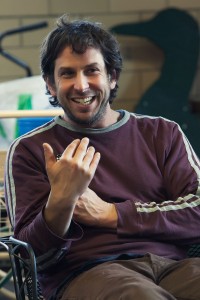
On mentoring
Rachel: If we’re all talking about changing Detroit, we have to start in the schools. We aren’t the ones who are going to change it any more. What we must teach is behavior change. And how do you start? You find the champions. One amazing person at a time.
Harry: I think one of the barriers and challenges is to bring more Detroiters in on this work. For every gardener out there, there are dozens who walk past us and say what the hell are you doing. The challenge runs deeper than the physical work. It’s a paradigm shift.
Blair: I feel differently. I’ve been working in a neighborhood on the east side. It’s been a profound experience for me, and I went into that work really believing that the culture shift is for everyone, not just Detroiters. It’s for metro Detroiters, it’s for my family, as much as it is for the people in this neighborhood.
There’s an expectation that people don’t want to do this work and they need to change and they need to be brought along. But I’m seeing something radically different.
“People just need to be heard, and those who are used to having a voice can practice becoming allies, rather than leaders.”
The city has been my greatest teacher. The blessings aren’t always wrapped in the way I expect them to be. I think there’s hope and power in what people already are doing and in the culture that already exists here.
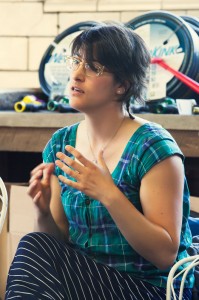
On partnerships
Eitan: The Eastern Market: As one of the oldest continuous operating farmers’ market in the country, the Market plays a large growing role. I can’t list all the projects, but the Detroit Community Markets initiative supports 16 neighborhood markets across the entire city.
Amit: Neighborhood associations: Detroit SCA works in partnership with many neighborhood organizations supporting and advocating for Detroit’s parks. I am inspired by the folks in the meetings, often community elders, who fight for our parks, keep the gates open, the grass mowed and the trash picked up. We need to give young people a reason to attend those meetings and take ownership of their neighborhood green spaces.
Rachel: To take that one step further, sometimes you have to build the partnership, yourself. It’s not that we need to go in and teach this “other culture.” The way recycling happened in Detroit is that it simply didn’t exist. So we opened our doors. We created the infrastructure.
“Any time you create new infrastructure, you have to teach.”
It’s not about ignorance. It’s just something new you have to teach.
Jeff: Building networks is an organic process. We’re cheerleaders for each other.
Blair: There is magic to opening yourself to what is possible. When you’re open to learning and being pulled along, the potential is really beautiful.
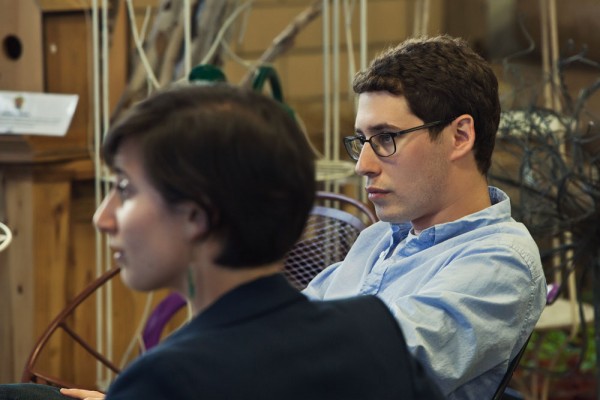
Conclusions
Eitan: One last word to mention here: justice. It’s the underpinning of the work we see, and which we try to orient our lives and work around. Whether it’s rooted in Judaism or not, it’s rooted in the nature of the work that we do.
Josh: For me, as a Jewish professional and a Detroit resident, it is a blessing and a privilege to be able to support this kind of meaningful work through the Do It For Detroit Fund micro-grant program. Di4D has been such a humbling, educational and rewarding experience. The fact that there is a demand for us at NEXTGen Detroit to be involved in supporting these individuals and their organizations is a testament to our community and our values.

